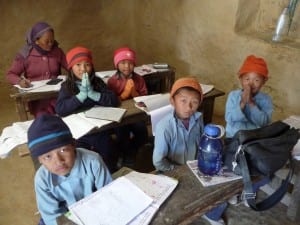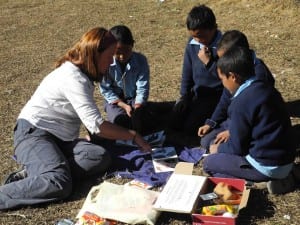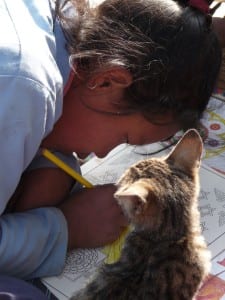 Jenny volunteered in Nangi for five weeks in December 2012 and January 2013. Her is what she had to say about her experience:
Jenny volunteered in Nangi for five weeks in December 2012 and January 2013. Her is what she had to say about her experience:“I first heard about Nangi village 11 years ago from another volunteer and recently I was lucky enough to volunteer there myself. It was a fantastic experience. The people of Nangi are so welcoming and big hearted and happily include you in their daily life and work. The village and surroundings are just stunning…pine forests, farm land and snow capped mountains.
I had read on the Nangi website from a former volunteer that although the students of Nangi could read and write English quite well, they weren’t very confident speaking English, so that gave me the idea for my project. My original plan was to help the older students learn spoken English but when I arrived, I was instead asked to teach grades 2,3,4 and 5 which was fine. The other part of my project was to get the children reading English books for fun and enjoyment. In Nepal the children learn English from text books that seemed very boring. Before I went to Nangi, I collected second hand books and teaching aids (puzzles, games and picture cards) that were high interest, colourful, culturally appropriate and (most important) light weight and these really helped with the teaching as I was completely hopeless at learning the Nepali language.
 I took my classes outside in the sun whenever possible because it is so cold and dark in the classrooms in winter. I was in Nangi for 5 weeks which didn’t seem long for what I was doing but I did see the students become very engrossed in reading the books each day and certainly get more confident in speaking English. Another positive outcome was the setting up of the Himachal English Fan Club for the senior students, thanks to Chandra the English teacher. It’s a sort of English for Fun club run by the students with a collection of comics, sports books, puzzle books,etc that they can keep in the class and borrow any time. I also got them a small collection of English DVDs (mostly family movies so they wouldn’t be too culturally confronting) which they can run on film nights. It’s hard to speak English when you rarely hear it spoken! I also got to guide the primary kids on their first ever use of a computer using a very simple language program/game I’d brought from Australia which was incredibly exciting for all of us.”
I took my classes outside in the sun whenever possible because it is so cold and dark in the classrooms in winter. I was in Nangi for 5 weeks which didn’t seem long for what I was doing but I did see the students become very engrossed in reading the books each day and certainly get more confident in speaking English. Another positive outcome was the setting up of the Himachal English Fan Club for the senior students, thanks to Chandra the English teacher. It’s a sort of English for Fun club run by the students with a collection of comics, sports books, puzzle books,etc that they can keep in the class and borrow any time. I also got them a small collection of English DVDs (mostly family movies so they wouldn’t be too culturally confronting) which they can run on film nights. It’s hard to speak English when you rarely hear it spoken! I also got to guide the primary kids on their first ever use of a computer using a very simple language program/game I’d brought from Australia which was incredibly exciting for all of us.”TIP: If you want to keep in touch with the outside world take your own laptop. The school has computers but they’re not always available.
1) Teaching the primary children and their teachers basic computer skills and usage. There is a small computer lab with 6 or so computers for the primary classes but it’s not used much at the moment.
2) Helping students with English speaking and reading aloud.
3) Increasing the usage of the books and resources in the library.
2) Helping students with English speaking and reading aloud.
3) Increasing the usage of the books and resources in the library.


Leave a Reply